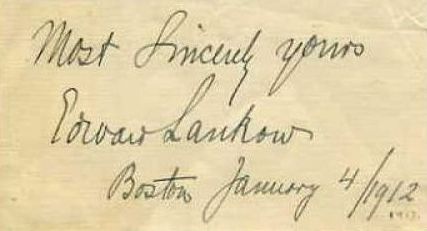

His brother Hakon Schmedes became later a known violinist, another brother, Paul Schmedes (1869-1930), became a successful concert tenor. Erik at first studied piano in Copenhagen, then he received his musical education in 1888 at Berlin. Then on suggestion of Pauline Viardot-Garcia he started to study singing. First he studied under Nikolaus Rothmühl in Berlin, then with Johannes Ress in Vienna as well as by Mariano Padilla y Ramos in Paris. He made his debut as baritone in 1891 at the Court Theatre of Wiesbaden as Valentin in ‘’Faust’’. Since 1893 he sang at the Municipal Theatre of Nuremberg, where he remained till 1896. Then, nevertheless, the manager of the Hamburg Opera, Bernhard Pollini, discovered his tenor, and after renewed study with August Iffert in Dresden he appeared in the 1896-97 season at the Dresden Court Opera as a heroic tenor. In 1898 he was engaged by the Vienna Court Opera, where he made his debut as Siegfried in Wagner's ‘’Siegfried’’. Longer than 25 years he was the favorite tenor of the of Vienna Court Opera’s audience. In 1908 he performed at the Viennapremière of d'Albert’s opera ‘’Tiefland’’in the title role of Pedro, in 1919 he sang the title part in the première of Pfitzner’s ‘’Palestrina’’, in 1914 he already sang the title role in the première of the Wagner’s ‘’Parsifal’’. In 1910 he appeared there in the premiere of the opera "Der Musikant" of Julius Bittner. Famous he became by his Wagner's parts, but also as Florestan in ‘’Fidelio’’ and as Palestrina in Pfitzner’s ‘’'Palestrina’’. In 1899 and in the 1901-02 season and again in 1906 he appeared at the Bayreuth Festival, where he had great success in Wagner’s ‘’Siegfried’’ and ‘’Parsifal’’. In the 1908-09 season he sang at the MetropolitanOpera of New York (beginning part: Siegmund in ‘’Walküre’’). In 1908 he sang there the role of Pedro in the American première of the opera ‘’Tiefland’’ of E. d'Albert. In 1924 he retired from the stage appearing for the last time as Matthias in ‘’Evangelimann’’ of Kienzl at the Vienna State Opera and then he worked as a pedagogue at Vienna. One of his pupils was famous soprano Maria Müller. His daughter Dagmar Schmedes was a known soprano.
Chronology of appearance
1891 Wiesbaden Court TheatreFaust (Valentin)
1893-1896 Nuremberg Municipal Theatre
1896-1897 Dresden Court Opera
1898 Vienna Court Opera Siegfried (Siegfried)
1908 Vienna Court Opera Tiefland (Pedro)
1919 Vienna Court Opera Palestrina (Palestrina)
1908 New York Metropolitan Opera Tristano e Isotta (Tristano)
RECORDINGS FOR SALE
G&T, Wien 1902-06?
Evangelimann (Kienzl): Selig sind, die Verfolgung leiden42708 2377B
Evangelimann (Kienzl): Selig sind, die Verfolgung leiden42821 883x
Lohengrin (Wagner): Höchstes Vertrau'n 42820 879x
Lohengrin (Wagner) In fernem Land 2-42008 2379B
Lohengrin (Wagner) In fernem Land 42897 882x
Meistersinger von Nürnberg (Wagner): Morgenlich leuchtend 2-42519 881x
Rheingold (Wagner) Soweit Leben und Weben (Loges Erzählung) 42998 878x
Walküre (Wagner) Winterstürme wichen dem Wonnemond 42819 877x
G&T, Wien 1903-08?
Lohengrin (Wagner): Atmest du nicht 2-42579 758z
Lohengrin (Wagner): Nun sei bedankt (Schwanenlied) 2-42078 975'c
Rienzi (Wagner): Erstehe, hohe Roma 2-42574 757z
Meistersinger von Nürnberg (Wagner): Am stillen Herd 2-42757 885½z
Siegfried (Wagner): Schmiede, mein Hammer (Schmiedelied) 2-42731 886z
G&T, Wien 1904-10
Lucia di Lammermoor (Donizetti) Sextett with Elizza, Lukschic, Preuss,Weidemann, Mayr and chorus 44432 2444h
Pathé cylinders & discs, Wien 1905?
Pagliacci (Leoncavallo): Lache, Bajazzo 19241
Rienzi (Wagner): Erstehe, hohe Roma 19242
Siegfried (Wagner): Schmiedelied 19246
Meistersinger von Nürnberg (Wagner): Am stillen Herd 19248
Favorite, Wien 1905-04-05
Lohengrin (Wagner): Mein lieber Schwan (Abschied) 1-25030 772-f
Pagliacci (Leoncavallo): Scherzet nur immer (Un tal gioco) 1-25029 771-f
Walküre (Wagner): Winterstürme 1-25046 773-f
G&T, Wien 1905-12?
Trovatore (Verdi): Terzetto Hermine Kittel, Elizza Elise 2-44027 651r
Norma (Bellini): Was mich kräftigt (w. chorus) 3-42461 700r
Pikova Dama (Tchaikovsky): Beherrschest du mein Fühlen 3-42504 804r
Rienzi (Wagner): Erstehe, hohe Roma with chorus 3-42414 702r
Trovatore (Verdi): O Gott, du schweigst with Elizza and Kittel 2-44027 651r
G&T, Wien 1906-05/06
Morgenhymne (Henschel) 3-42561 4130L
Winterlied (Koss) 3-42618 4132L
Guillaume Tell (Rossini): Er fiel, er starb with Stehmann and Hesch 2-44109 4272L
Evangelimann (Kienzl): Selig sind, die Verfolgung leiden3-42597 4239L
Lohengrin (Wagner): In fernem Land 042132 269m
G&T, Wien 1906-12?
Prophet (Meyerbeer): Trinklied 3-42723
Königin von Saba (Goldmark): Du Ew'ger, der mein Aug' gelichtet 3-42774 9997u
Muette de Portici (Auber): Barcarole 3-42756 9998u
Prophète (Meyerbeer): Trinklied 3-42723 9928u
G&T, Wien 1907
Parsifal (Wagner): Nur eine Waffe taugt 3-42852 10918u
Siegfried (Wagner): Nothung! (Schmiedelied) 4-42024 11964u
Samson et Dalila (Saint-Saëns): Israel werde frei 3-42890 10920u
Parsifal (Wagner): Nur eine Waffe taugt 3-42852 10918u
Samson et Dalila (Saint-Saëns): Ist der Herr nicht bei dir 3-42854 10919u
Siegfried (Wagner): Schmiede, mein Hammer (Schwertlied) 4-42034 11748u
Götterdämmerung (Wagner): Mime hiess (Erzählung) 4-42025 11965u
Gramophone, Wien 1908
Tiefland (d'Albert): Ich grüss' noch einmal meine Berge 4-42132
Tristan und Isolde (Wagner): So stürben wir with Bland 2-44411 13156u
Tristan und Isolde (Wagner): O sink' hernieder with Bland 2-44412 13157u
Gramophone, Wien 1909-09-16
Götterdämmerung (Wagner): Brünnhilde, heilige Braut 4-42337 15109u
Gramophone, Wien 1909-09-16
Götterdämmerung (Wagner): Zu neuen Taten with Weidt 044143 01197v
Gramophone, Wien 1909-10-27
Lohengrin (Wagner): Das süsse Lied verhallt with Elizza 3-44077 15043u
Gramophone, Wien 1910-10-28
Tannhäuser (Wagner): Da sah ich ihn 042291 2072c
Tannhauser (Wagner): Inbrunst im Herzen 042291 2072c
Favorite, Wien 1912?
Lohengrin (Wagner): Abschied 1-25036x 5252-t
Lohengrin (Wagner): Gralserzählung 1-25035x 5251-t
Meistersinger von Nürnberg (Wagner): Preislied 1-25034x 5250-t
Tosca (Puccini): Und es blitzten die Sterne 1-25042x 5256-t
Tosca (Puccini): Wie sich die Bilder 1-25041x 5255-t
Walküre (Wagner): Winterstürme wichen dem Wonnemond 1-25033x 5249-t
Pagliacci (Leoncavallo): Jetzt spielen 1-25039x 5254-t
Evangelimann (Kienzl): Selig sind die Verfolgung leiden1-25040x 5257-t































